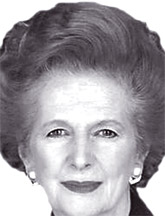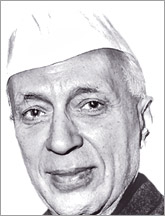“Touch of Caesar” and “Jewel of India”
Geoff Wijesinghe
History is replete with hoaxes, many of them having hit the headline.
A hoax is a humorous or malicious deception, designed to hoodwink
friends, society and even the world. Hilaire Bellock, the famous
litterateur was of the view that a good hoax, when executed with good
competence, gains a sharpness, which cannot fail to be noticed.
 |
 |
 |
|
Margaret Thatcher |
Mikhail
gorbachev |
Pundit jawaharlal Nehru |
Indian author R. Krishnamurthi, in his book titled World Famous
Hoaxes, has recorded some of the more prominent and sensational
deceptions.
An article titled “Rashtrapati”, which appeared in The Modern Review,
one of the popular magazines of the times, stirred public indignation.
For, it carried barbs of criticism of Pundit Jawaharlal Nehru’s mental
faculties, innate talent and drive and initiative.
The writer, who had chosen to remain anonymous, had noticed streaks
of autocracy in Nehru’s attitudes. Nehru had been hailed by Mahatma
Gandhi as “the Jewel of India”. The author held the view that there was
no need for the people to exercise caution, rein in Pundit Nehru, lest
he turned into a Caesar, ended up as an autocrat.
The article appeared when there was a call from a large section of
the members of the Congress, as also the public, to break past
traditions and to elect Nehru, for a third term, as the president of the
Congress.
Indian society
It was the belief of the writer that such a step would fan the ego of
Pundit Nehru and make him feel that he was indispensable. Herein,
thought the writer, lay a grave danger to Indian society.
None could deny that there was much validity in some of the
projections made by the writer about the basic nature of Pundit Nehru.
It was true that he commanded the love of the people in abundant
measure. Truly, he had moved from Kashmir to Cape Comorin, received
tumultuous welcomes everywhere, states Krishnamurthi.
Equally true was the assertion that “he left a trail of glory and a
legend behind him”. The tours could well be compared to the triumphant
march of Caesar. Yet, there was a subtle difference.
Democratic traditions
Caesar was the man who held absolute power. Pundit Nehru was a
political leader, fighting against the Raj, clamouring for the
liberation of the country. He enjoyed no power, except what was reposed
in him by the resistance movement, by the Congress. How could a man, on
the wrong side of authority, ever became a Caesar?
This was the main point of dispute. This was the issue on which the
public wanted to tick the writer off. But, he stayed behind anonymity.
None knew who could have drawn this profile of Pundit Nehru.
References were made to the Editor of The Modern Review. Everyone
wanted to know the identity of the critic. The Editor affirmed that the
article did not carry any byline. He had received it, read it, found it
controversial enough to provoke a debate and hence published it.
This explanation did not satisfy anyone.
Could it have been contributed by Mahatma Gandhi himself? This was
one of the doubts expressed in some quarters. However, the finger of
suspicion did not continue, pointing at Gandhi for long, with everyone
agreeing that if he had wanted to express his view, he would have made
them explicit. The search, in the meantime, continued unabated.
All the while, Nehru remained aloof and did not evince any interest
in finding out the identity of the author.
Everyone received a shock when the truth spilled out, at last.
It was Pundit Jawaharlal Nehru, who had contributed the article. He
had, in a mood of self-introspection, taken a look at himself and been
frank enough to bare some of his inherent traits. Thus, did he strike a
blow in defence of tradition, in favour of democracy. For he made it
clear that he was not available for a third term. Krishnamurthi states
that it was a hoax played by Nehru to prove to the nation that they
should stop deifying him. The article was one more proof of his
determination to stay true to democratic traditions.
What had Maggie gone and done?
This was the question, which surged up when the readers of the Daily
News of Britain saw the photograph flashed on the front page. They
examined the photograph carefully.
There was no mistaking the lady in the snap. It was Margaret
Thatcher, (then) Prime Minister of Britain. She was reputed for her
hardiness. She had shown grit and firmness in handling the nation’s
affairs. Like Mrs. Gandhi, she too became identified as the only “Man in
the Cabinet,” The “Iron Lady.”
Communist ideology
How could she have softened enough to kiss the Soviet leader Mikhail
Gorbachev? That too in a public place, like the Gorky Park in Moscow?
The year was 1987. The thaw had already begun. Gorbachev had sent signs
of adopting a more rational attitude towards communist ideology. The
views he were soon to project through “Perestroike” and “Glasnot” were
very much in the air.
It was during such transient times that Mrs. Thatcher had undertaken
a tour of Soviet Russia. It was during her stay there that she was
caught by the camera, shedding her reserves and behaving like a normal
woman.
The whole nation felt aggrieved. Yet, the photograph left no room for
any doubt. Soon, the paper was brought to Mrs. Thatcher. Her aide
pointed out the photograph and said it was the talk of the town. She let
her eyes become tiny slits as she bent down to get a closer look of the
photograph.
She leaned back in her chair when her eyes fell on the calendar. Then
she saw the truth. She laughed loudly. She grinned, told the aide,
“Today is First of April, my man.” Later, when press reporters
questioned her, she cut back, “Loof Lirpa.”
Read it back. It is the reverse of April Fool. The Daily Mirror had
explained that “Loof Lirpa” was an old Ukrainian expression for
happiness. The paper admitted that the term defied translation. Mrs.
Thatcher, shrewd enough to pick the cue, used the expression to put the
episode in the proper perspective. |





